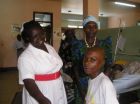Researchers crack cuckoo egg mystery
2010-09-22
(Press-News.org) Researchers at the University of Sheffield have discovered that cuckoo eggs are internally incubated by the female bird for up to 24 hours before birth, solving for the first time the mystery as to how a cuckoo chick is able to hatch in advance of a host's eggs and brutally evict them.
Published today (22 September 2010) in the journal Proceedings of the Royal Society of London, Series B, the research shows that internal incubation allows the cuckoo chick to hatch before its nest mates, evict them, and monopolise the food brought by the foster parents.
Although previous studies have suggested early hatching is achieved partly through the cuckoo producing a small egg which develops faster, it has long been suspected that there might be another reason for this.
A team from Sheffield, headed up by Professor Tim Birkhead, from the University's Department of Animal and Plant Sciences, worked with cuckoo researchers across Europe, to examine the newly laid eggs of eight cuckoos, and discovered that each one was at a more advanced stage than is normal among small birds. To test the idea that this advanced development was a result of the female cuckoo retaining the egg inside her, they simulated 'internal incubation' in another species; the zebra finch.
The researchers took recently laid finch eggs and incubated them for 24 hours at body temperature, which is 40oC in both the finch and the cuckoo. After this time, the zebra finch eggs were at the same stage as the cuckoo eggs at the time they were laid.
Superficially this suggested that the internal incubation gives the cuckoo a 24 hour head start over its host's eggs, but the researchers discovered it is in fact more than this.
When eggs are incubated by the adult birds in the nest, their eggs are at about 36oC. Inside the female, the egg is at a body temperature of 40oC. This difference in temperature means that 24 hours at 40oC gives the cuckoo egg a 31 hour head start over the host eggs.
Most birds release their ovum or the yolk of the egg from the ovary 24 hours before it is laid. Fertilisation occurs within 15 minutes of ovulation, and the ovum then spends about 24 hours having the albumen, or egg white, and the shell put on to form a normal egg. This fully formed egg is laid 24 hours after ovulation. Significantly, about six hours after the ovum is fertilised, the microscopic embryo begins to develop and by the time the egg is laid, the embryo contains some 10,000 cells. It is only after two days of incubation that there are any signs, visible to the naked eye, that the egg is developing and an embryo forming.
In the cuckoo however, the team demonstrated that the egg is ovulated and fertilised and then six hours later embryo development begins. As the egg passes down the oviduct, or egg tube, the white and shell are added, and once the egg is fully formed, about 24 hours after it was released from the ovary, it then sits in the female's oviduct for a further 24 hours. In other words, by the time the cuckoo egg is laid, it has had 18 to 24 hours of internal incubation at 40oC and hatches 31 hours ahead of any host egg laid at the same time.
Professor Tim Birkhead, from the Department of Animal and Plant Sciences at the University of Sheffield, said: "The idea of internal incubation in birds has until now been considered impossible because it was assumed that female birds could not hold onto a fully formed egg. In fact, the idea of internal incubation by cuckoos was suggested as early as 1800, but then ignored. Our results show that internal incubation gives cuckoo chicks that crucial head start in life, allowing them to dispose of their nest mates – a superb adaptation to being a brood parasite."
INFORMATION: END
ELSE PRESS RELEASES FROM THIS DATE:
2010-09-22
With the help of genetic materials from a cow's rumen, U.S. Department of Agriculture (USDA) scientists are developing new ways to break down plant fibers for conversion into biofuel.
To convert corn stover and switchgrass into biofuel, the plant fibers must first be broken down into sugars. But cell wall polymers are cross-linked in various ways that make them very resistant to breaking down, according to Dominic Wong, a chemist at the USDA Agricultural Research Service (ARS) Western Regional Research Center, in Albany, Calif. ARS is the principal intramural scientific ...
2010-09-22
If you are more inclined to love thyself than thy neighbor, it could be your mother's fault.
Those are the findings of Francisco Úbeda, assistant professor of ecology and evolutionary biology at the University of Tennessee, Knoxville.
Úbeda, along with fellow evolutionary biologist Andy Gardner from Oxford University, examined the impact that genomic imprinting has on the carrier's selfish or altruistic behavior. Genomic imprinting is the phenomenon in which the expression of a gene depends upon the parent who passed on the gene. Every person has a set of chromosomes ...
2010-09-22
EAST LANSING, Mich. — Developing language skills appears to be more important for boys than girls in helping them to develop self-control and, ultimately, succeed in school, according to a study led by a Michigan State University researcher.
Thus, more emphasis should be placed on encouraging boy toddlers to "use their words" – instead of unruly behavior – to solve problems, said Claire Vallotton, MSU assistant professor of child development.
"It shouldn't be chalked off as boys being boys," Vallotton said. "They need extra attention from child-care providers and teachers ...
2010-09-22
INFORMATION:
Research in Boston University’s Center for Space Physics involves interdisciplinary projects between members of the Astronomy Department in the College of Arts and Sciences and faculty, staff and students in the College of Engineering. Research areas include observational and theoretical studies in atmospheric, ionospheric and magnetospheric physics, planetary and cometary atmospheres, solar and heliospheric physics, and space weather.
Founded in 1839, Boston University is an internationally recognized private research university with more than 30,000 ...
2010-09-22
September 22, 2010 – (BRONX, NY) On Monday, September 27, researchers from Albert Einstein College of Medicine of Yeshiva University will hold a congressional briefing in Washington, D.C., aimed at focusing attention on the alarming global diabetes epidemic. Incidence of diabetes is increasing worldwide at a rate that eclipses most other diseases. The World Health Organization estimates that by the year 2030, more than 366 million people will be suffering from diabetes, 10 times the number affected by HIV/AIDS. Of that 366 million, more than 298 million will live in ...
2010-09-22
How could the current financial crisis have happened? While fingers have been pointing to greedy banks, subprime-loan officers, and sloppy credit card practices, these are not the only contributors to the economic downturn. A new report in Psychological Science in the Public Interest, a journal of the Association for Psychological Science, examines the psychology of financial decision making, including the role of risk in making economic choices, how individuals behave in stock and credit markets, and how financial crises impact people's well-being.
Risk taking is a ...
2010-09-22
Alexandria, Va., USA – Dental caries is a highly prevalent disease that is disproportionately distributed in the population. Caries occurrence and progression is known to be influenced by a complex interplay of both environmental and genetic factors, with numerous contributing factors having been identified including bacterial flora, dietary habits, fluoride exposure, oral hygiene, salivary flow, salivary composition, and tooth structure. Previous reports have characterized the influence of the genetic variation on taste preferences and dietary habits.
In an article ...
2010-09-22
ROCHESTER, Minn. -- A new Mayo Clinic study found that nerve inflammation may cause the pain, numbness and weakness following surgical procedures that is known as postsurgical neuropathy. The development of postsurgical neuropathies is typically attributed to compression or stretching of nerves during surgery. This new research shows that, in some cases, the neuropathy is actually caused by the immune system attacking the nerves and is potentially treatable with immunosuppressive drugs. The study was published in this month's issue of Brain.
Postsurgical neuropathy is ...
2010-09-22
The water in the canals and irrigation channels in the L'Albufera Natural Park in Valencia contain cocaine, ecstasy and a further six drugs. This has been confirmed by a study carried out by researchers from the University of Valencia (UV), who have issued a warning about the continued presence of these substances on wildlife and human health.
"The results confirm the presence of drugs such as cocaine, amphetamines, codeine, morphine and cannabis in the surface waters of the L'Albufera National Park at levels ranging between 0.06 and 78.78 nanograms/litre", Yolanda Picó, ...
2010-09-22
Children conceived by in vitro fertilization (IVF) perform at least as well as their peers on academic tests at all ages from grade 3 to 12, according to a new University of Iowa study.
In fact, the study, published in the October issue of the journal Human Reproduction, found that children who were conceived by IVF actually scored better than age- and gender-matched peers on the Iowa Test of Basic Skills and the Iowa Test for Educational Development (ITBS/ED).
"Our findings are reassuring for clinicians and patients as they suggest that being conceived through IVF ...
LAST 30 PRESS RELEASES:
[Press-News.org] Researchers crack cuckoo egg mystery



